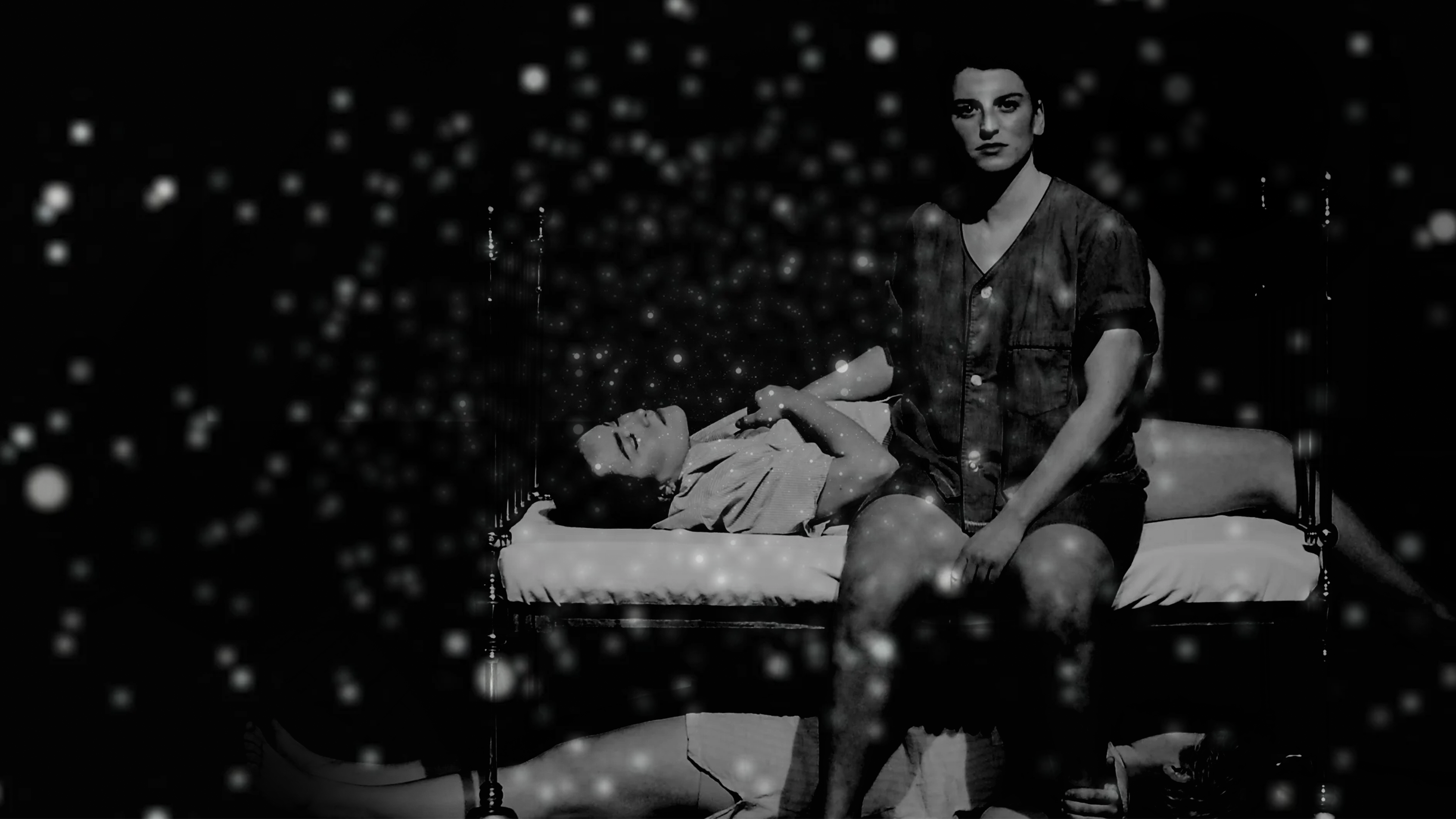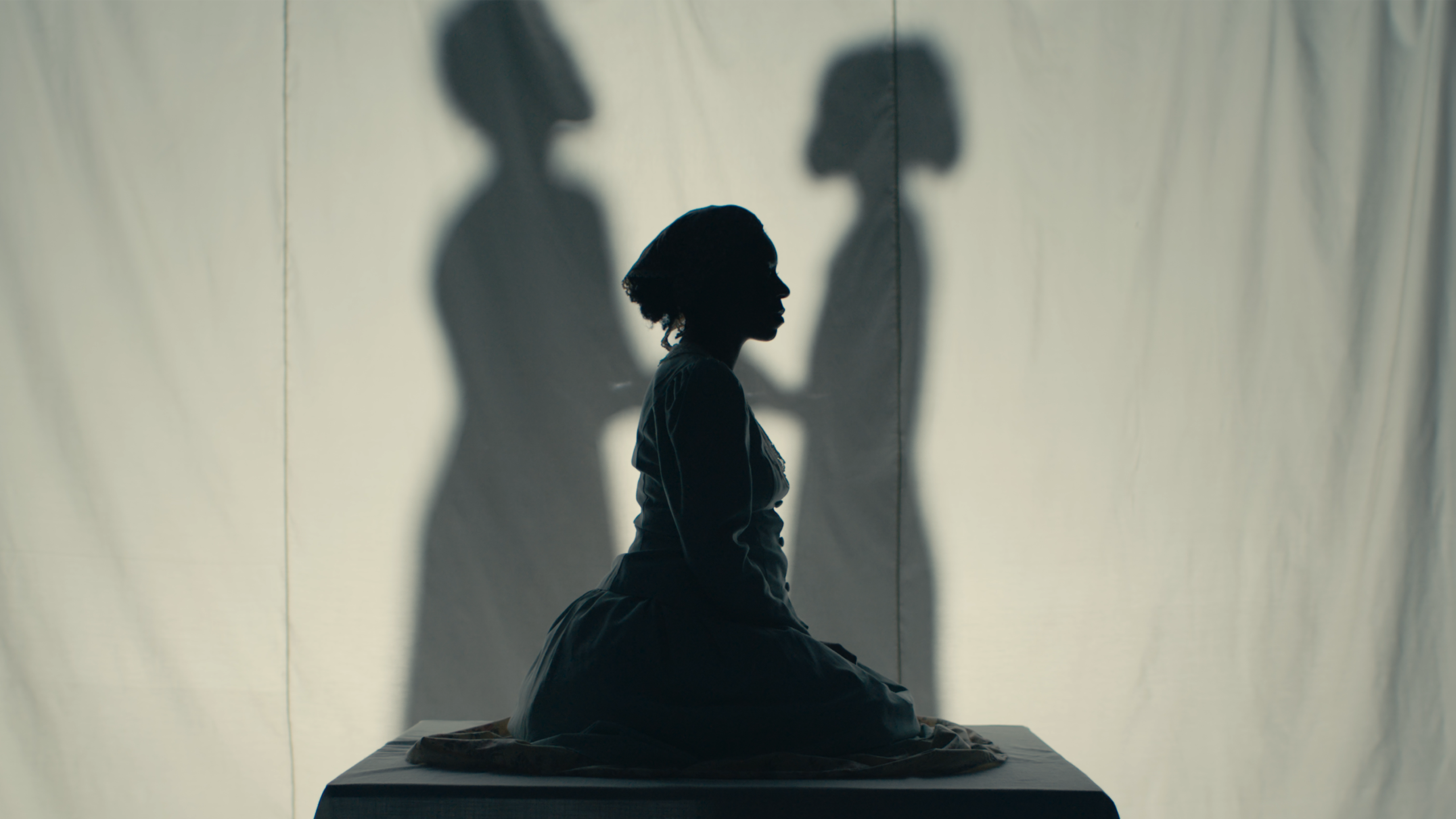This run of 4.48 Psychosis was staged in February 2023 at Color Club. The production had filmed projections, which were created by sponsored Camera Ambassador equipment.

Still from the 4.48 Psychosis projections | Texas Smith
We had the opportunity to go behind-the-scenes with the creatives behind the project:
Claire Bauman (CB) (She/Her), Producer and Director
Amy Carpenter (AC) (She/Her), Producer and Part of the Performing Ensemble
Taylor Dalton (TD) (She/Her), Producer and Lead Design
What is 4.48 Psychosis about? What did your production do that was unique?
AC: 4.48 is the ultimate text written by the playwright Sarah Kane. She took her own life in the process of writing it. It is a distillation of her mental state around the time that she decided to take her own life.
Many people from the jump assume that it's a play about suicide and death. I believe that it is not. We really challenged ourselves with imbuing the text with an energy and a life force without changing the words. We turned the lens on what it means to be human and to fight for staying alive and giving respect to the choice of not being alive.
CB: Overall, our core was that it is a play about the struggle of life.
Because of how Sarah approaches theater and playwriting, it's also so open to interpretation. The script is almost more like a poem. There's no character list and therefore there are no line assignments.
Traditionally, the play has been done with three people. We chose to do it with four people based off of the voices or perspectives we heard within the text. From that choice, we, within our production, found that part of the struggle of life is also this desire and need to reconnect with an inner child and play with your youth - that is part of the cost and the struggle of living.
Because your approach is more centered on life rather than the idea of death and you're dealing with such heavy material, are there other ways in which your approach to the material helped create a safe environment for everyone to engage emotionally?
CB: That was really important to us because we were uplifting life within this [production]. But, this is also about suicide and real intense mental health struggles. It’s the paradox of those two things bumping up against each other.
To set up that space and hold that tension - what was really important to us from the beginning was being really clear that “no” is a good answer. When we put out the call to invite people to do some workshops with us, we said: ‘it's okay if this [production] isn't for you’.
We also set an opening and closing ritual to our rehearsal process that set up some boundaries for us. We were also very clear when we started the rehearsal process that we are not expecting each cast member to reveal their own personal mental health journey. They do not have to perform suicide or a mental health crisis, be it an imagined one or their own.
AC: It's a privilege to say this, right? I'll clock that now. But, we were coming to this work from a place of feeling mentally well enough to engage with it. We were only interested in people coming into the room, audience included, who felt like they could - that they had personally bolstered themselves enough to do it.
We were more interested in discussing all of the layers within the human experience where you're encountering not only yourself but other people and how to explain to another person (who's not in your mind) what is going on in a way that they will relate and understand.
I think Sarah, in some ways in this text, was looking for someone to give her permission in a way to think the way that she was thinking. Maybe not all the way to committing suicide or self murder, but I think she was just looking for someone to be like, it's okay that you're having that these thoughts.

Still from the 4.48 Psychosis projections | Texas Smith
I love this idea of the play showing empathy for what the experience of depression is like. Within the text, were there any favorite moments that you remember performing that you felt were emblematic of that empathy?
AC: So many.
We essentially staged this breakup scene between “Sarah” and this doctor-lover character. We had one of our ensemble members, who was portraying the lover, grinding a pepper grinder throughout the entire scene onto the floor. This pile of peppers [is] collecting on the floor, you get the sound of this pepper grinder… There's no other things happening on stage other than them talking to each other.
I love this moment particularly so much because it's so deeply funny, so deeply unsettling, so deeply sad. At the same time, this is what it is like to be a human being and to experience all of those things at once in the same scene.
I'm pretty sure the pepper was Claire's idea, so kudos to Claire.
That's such a visceral image.
CB: There were many moments of [how] we approached these deep mental moments - we were trying to find the metaphor and these visceral qualities to represent states of being. Another thread we found throughout the play was this idea of disembodiment. It's so difficult to live if you can't feel whole. So, I think a large part of the journey is striving for this wholeness. The use of projection and filmed media was another really useful tool and way of embodying the disembodied.

Still from the 4.48 Psychosis projections | Texas Smith
In what ways did you use projections to manifest that disembodiment?
CB: Yeah. There's this really brutal kind of monologue - that really kind of hedges on gratuitous. The actor who gave this monologue early on smartly identified it as a moment of intrusive thoughts, because this monologue is this kind of guilt where the speaker says: ‘I caused all of these terrible things.’ The first line is: ‘I gassed the Jews, I killed the Kurds, I bombed the Arabs.’ So, referencing all of these horrible genocidal and war events that were enacted on people and the speaker is framing them through their individual experience.
But then, mid-monologue, it also shifts to this really almost funny personal level, where she says: ‘Everybody left the party because of me.’ The juxtaposition of these geopolitical moments plus these party moments was really fascinating.
Anyway, we used filmed projection in this moment where we did a close up on the actor's face to deliver that monologue straight to the camera. Then, we used that filmed version projected, but without the sound so you just saw her lips moving. So, she was delivering the monologue, but with no audio on the projector. Then, in the room, this actor was kneeling at the lip of the stage and delivering the monologue verbally.
It was a really, really beautiful moment using the projections. Texas was also so good at just jumping right in to understanding the particular moment and what our vision was at the outset, but then saying ‘what about this? Here's how to execute what I'm hearing you say.’
All of these projections were filmed by our good mutual friend Texas Smith with Camera Ambassador equipment. How did that collaboration come about and what was it like?
AC: Texas and I met when we were both doing an acting conservatory program in 2018. I was lucky enough to be in his first film project out of that program: Phosphorescence. He's produced for me on another film project that I worked on. So, we have had this symbiotic relationship ever since. He's the first person I go to when I wanna talk about anything filmed because I really love his eye and I think he's got a really great talent for specific grounded work. Going into 4.48, I already knew that I was interested in projections.
They [projections] are kind of cliches in theater right now because they came on the scene 10-15 years ago as an effective mode of communicating an added layer of technology in theater. They're kind of cliche at this moment in time because they may suffer from overuse or people will use them without purpose.
So, I knew that I wanted projections because I think, when done well and done right, they do offer a layer of ability to highlight what's being said on stage.

A behind-the-scenes photograph of the 4.48 Psychosis production | Taylor Dalton
What excited you all about the story to begin with?
CB: To me, the kind of theater I'm always drawn to - and Sarah [Kane] I think just really exemplifies this - is really manipulating how you tell a story to hit on something really, really core to humanity and challenging what our norms are. Then, presenting a story in this really beautiful way that I think can uplift and invigorate people.
TD: I also engaged with Sarah's work in college about a decade ago - I worked with this piece specifically.
There isn’t a lot of beating around the bush with feelings [in 4.48 Psychosis]. It's very direct. It's very raw. It's very visceral. Words are potentially triggering thematically, but also triggering just in being a human and being alive.
We were very particular about not romanticizing, or even dramatizing, suicidal thoughts. But, really just getting to the core of the struggle with life and with why we're here and what we're doing and the own kind of internal voices that sometimes are in stark contrast to one another.
But, I do think that there could be something to her knowing about herself and her own struggle and really attacking her own art from the perspective of having nothing to lose. I think there is something really exciting about pursuing a piece with the same sort of “nothing to lose” attitude perhaps that I'm positing Sarah might have had with her own work.
There is something in our interest of self-producing without abandon - we are gonna do this piece and we're gonna do it the way that we wanna do it. We're gonna do it with the people that we wanna do it with, and we're gonna do it by our own rules.
AC: For me personally, I asked Taylor if she wanted to do this with me almost a year and a half ago. What drew me to this piece was what I'm looking for in everything that I do creatively, which is that I am challenged by it. I have no idea how it's gonna happen or be executed.
If you're gonna put up a Shakespeare, you probably know at least a little bit what that's gonna look like in the end. As a performer and as a creator, I'm always looking for something that really is gonna surprise me.
I was challenged by her honesty when I first read this piece. I don't think that we get such a bare kind of inner monologue of a writer in most plays. I really felt challenged to do that justice. It's been a couple weeks now since we've stopped performing and the words are still echoing in my mind as they were after I first read it.
Maybe we can't see the forest through the trees until we get to the end of it. I think that was the goal. I think we did that and, specifically, with this piece of art. That's why I wanted to do it in the first place. [I’m] so, so very grateful.

A behind-the-scenes photograph of the 4.48 Psychosis production | Taylor Dalton
This interview has been edited for length and clarity.



